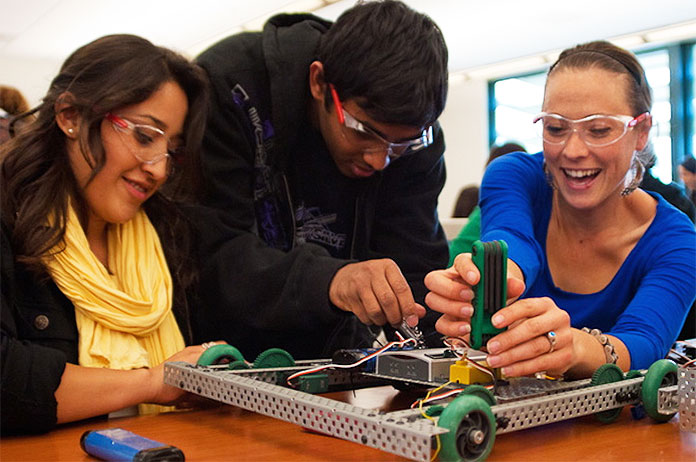Getting Ahead With STEM Education

As Cambodia continues to improve its education system, one area experts agree that needs improvement is the quality of STEM education, or the disciplines of science, technology, engineering and mathematics. Cambodia is not alone in this regard; the US and the UK are pushing STEM education at home, as well as overseas, because of the many benefits brought by a workforce with high math and science skills.
One area of concern we hear from our partners at B2B Cambodia is that their local employees have not had sufficient training in critical thinking and analysis, as well as project management and long term planning. STEM education, however, helps students to develop their analytical and reasoning skills in ways that can be applied to disciplines beyond math and science.
Integrated learning
The latest STEM approach to education teaches math, science, engineering, and technology classes as related parts of an integrated group of topics rather than as separate and distinct classes. Students can draw on lessons learned in each subject in a program that encourages experimentation and hands-on lessons. It also aims to make the sciences more appealing to students, as these are classes that are traditionally viewed as less “fun” or exciting.
“STEM helps develop greater thinkers, greater innovators, and problem solvers. It requires one to ask ‘why’ and ‘how’ about things that need to be built, invented, and designed,” says Todd Smith, Founder of Ripple Effect Consulting. It also “trains students to analyze, think, ask questions, hypothesize, and research to check out those hypotheses.”
Improving science and math skills, however, will not be a fast process, says Susanna Coghlan, Managing Director at American Academic Associates (AAA) Cambodia. It’s a long-term learning process that starts at a young age. “A lot of STEM education begins at very early levels. For example, studying engineering at university requires a strong foundation in mathematics from the secondary and even primary school levels,” says Coghlan. “The Ministry of Education is working actively on upgrading the education system from many angles with many other organizations, but we must remember it takes time to develop all that is needed.”
STEM careers
To win students over to STEM, it’s important to show them what they can do with a degree in these fields, says Coghlan. Career fairs like the Science and Engineering Festival, which was held for the second time in March, aim to show students that the sciences can lead to interesting and also lucrative careers.
“I think for many students in high school, awareness of the range of career and study options is limited so there seems to be a bigger focus on business-related fields, but that is changing,” says Coghlan. “Thanks to the efforts of a range of organisations and individuals, more and more students are becoming aware of a range of study and career choices that can offer good work and good career progression opportunities.”
Many students have the chance to get in on the ground floor of new industries and advance quickly in their field in terms of salary and position, which can be an exciting prospect for young people entering the workforce. Coghlan says technology, healthcare, and pharmacy are three fields that are expected to grow in Cambodia with increasing demand and improved lifestyles.
Many Cambodian students also do not realise that STEM skills can be used in fields far beyond math and science, in areas from design to law, says Smith. While students might not use their Algebra lessons in every field, they will be able to draw on critical thinking, creativity, and advanced reasoning skills acquired in the classroom.
“As we train many different emerging young leaders from many different industries there seems to be more of an interest in accounting, entrepreneurship and starting their own businesses/being their own boss. Often youth don’t realise that the STEM disciplines are often the basis for doing exactly this,” says Smith.
Made in Cambodia
While garment manufacturing makes up the majority of Cambodia’s exports and employs hundreds of thousands of women, the Kingdom is missing out on higher value-added manufacturing to Vietnam and Thailand, which have a more educated workforce. Manufacturing electronics and motor vehicles, for example, takes much more skill and education than producing clothing and shoes. Improving national STEM skills will make Cambodia's blue-collar workforce more internationally competitive.
“In [manufacturing], there is a greater demand for skills in electrical and mechanical engineering for entry level, and more roles in supervisory and management positions are opening up, giving greater opportunities for career progression than before,” says Coghlan. “As increased demand for services such as electricity and telecommunications grows, and upgrading of infrastructure continues, demand continues to grow for skilled people.”
With so many benefits, it’s easy to see why the Ministry of Education is on board with improving science and math education. While revamping the education system will be a long process, the government has been helped by a number of NGOs and associations like USAID and the British Chamber of Commerce, as well as private sector educational programmes. Now that the Kingdom has recognised the need for better STEM education, the education system can only improve.